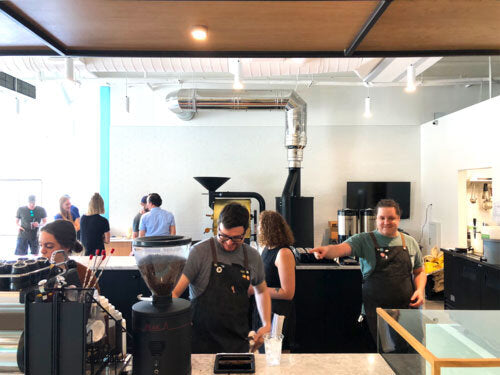
4 Reasons Why You Need a Burr Grinder
Looking to improve your home coffee brewing set up? The grinder is, hands down, the most important investment you can make. Brewing a good cup of coffee is all about extraction, and the quality of your grind is the key to extracting your coffee evenly.
Only 30% of the coffee bean is water soluble, and 20% of those solubles are pleasant tasting. Fortunately, the 10% of less tasty solubles move slowly, and take longer to extract from the bean.
The truth is, not all grinders are created equally… and chances are, the one in your kitchen as you read this is a blade grinder.
Why is this a problem? It’s pretty simple…. Blade grinders have uneven particle sizes, leading to less tasty coffee.
Burr grinders are the key to getting things right with a home coffee setup. With a burr grinder, you can avoid all of this by limiting the amount of time the water has contact with the coffee grounds. It’s the perfect complement to a craft coffee subscription.
4 reasons to take the plunge and buy a burr grinder:
1. Burr grinders create an even particle size for optimal extraction. When you grind coffee using a burr grinder, a small amount of coffee passes between the two burrs where it is crushed and torn into small, uniform particles. The more uniform the particle size of the coffee grounds, the more evenly the water will pass through the coffee bed.
2. Burr grinders allow you to replicate and/or tweak your brew time. If you are using a particular grind setting on your burr grinder, you can make small adjustments to lengthen or shorten your brew time. Blade grinders do not afford this luxury, as they lack consistency from grind to grind. When you grind coffee using a blade, the blade makes contact with the beans over and over again (creating friction and heat), and there is no way to guarantee that your particle size will end up being even. This results in certain parts of the coffee bed extracting earlier than others, and you lose control of your overall brewtime.
3. Brew methods that do not use a paper filter require an extra meticulous approach when grinding. If you use a french press, or have an espresso set up at home, a burr grinder is mandatory for achieving positive results. In the case of the french press, your grind must be very coarse, but also incredibly even since there is no filter to hold back any undesirable solubles. The water is in full contact with the ground coffee for 3 to 4 minutes. If your grind size is not even, or not coarse enough, the water will over-extract the coffee and you will end up with a bitter cup. In the case of espresso, your particle size must be incredibly fine and even to get a proper extraction within the 25-35 second brewtime. Blade grinders cannot achieve the level of precision required to execute either of these brew methods well.
4. The best time to grind your coffee is right before you introduce it to water. If you are trying to achieve a quality cup of coffee at home, your best bet is to grind your coffee right before you brew it. A single coffee bean contains about 4.5 million cells. When you destroy the structure of the coffee bean, all of the delicious solubles are released from those cells, and if you don’t extract them immediately, they will quickly degrade after being exposed to oxygen.
Blade grinders might be cheap, but they should be reserved for use as a spice mill (or something unrelated to coffee). Unless you like the taste of cheap coffee, it pays to invest in a burr grinder.
My home coffee setup includes the Handground hand grinder. I am able to grind about 50 grams of coffee in the time it takes my electric kettle to heat up!
They retail for $80, which is still $40 cheaper than the entry level automatic burr grinders on the market, and it produces a higher quality grind. I would highly recommend picking one of these up if you’re looking for a practical and economic solution to your home coffee setup. If you’re preparing to make the jump to a burr grinder, you will notice an immediate spike in the quality of your coffee at home.
Share




